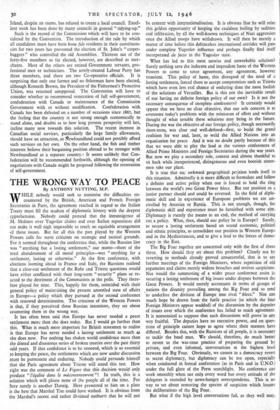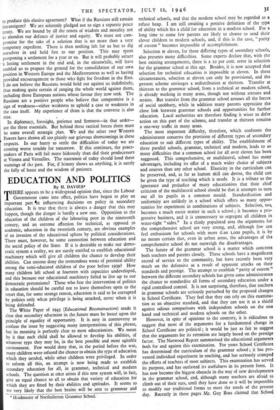THE WRONG WAY TO PEACE
By ANTHONY NUTTING, M.P.
WHILE nobody would seek to minimise the difficulties en- countered by the British, American and French Foreign Secretaries in Paris, the agreement reached in regard to the Italian Treaty must fill the student of diplomatic history with the deepest apprehension. Nobody could pretend that the intransigence of M. Molotov over Yugoslav claims and over Italian reparations did not make it well nigh impossible to reach an equitable arrangement of these issues. But for all this the part played by the Western Powers calls for stern criticism on strategic and tactical grounds. For it seemed throughout the conference that, while the Russian line was " anything but a lasting settlement," our motto—short of the total abandonment of all moral principles—was " anything for a settlement, lasting or otherwise." At the first conference, with elections looming ahead in France and Italy, the Russians realised that a clear-cut settlement of the Ruhr and Trieste questions would have either conflicted with their long-term " security " plans or re- acted to the detriment of the Communists at the polls. They there- fore played for time. This, happily for them, coincided with their general policy of maintaining the present unsettled state of affairs in Europe—a policy which they pursued at the second conference with renewed determination. The criticism of the Western Powers is that, if they perceived these Russian intentions, they set about countering them in the wrong way.
It has often been said that Europe has never needed a peace settlement more than she does today. But .I would go further than this. What is much more important for British statesmen to realise is that Europe has never needed a lasting settlement as much as she does now. For nothing has shaken world confidence more than the dismal and disastrous series of broken treaties over the past thirty odd years. If that confidence is to be restored, which is so essential to keeping the peace, the settlements which. are now under discussion must be permanent and enduring. Nobody could persuade himself that the Paris agreement about Trieste will stand this test. How right was the comment of Le Figaro that this decision would only produce " l'egalite dans le micontenternent "1 In truth, this is a solution which will please none of the people all of the time. For here surely is another Danzig. Here presented to him on a plate is the best that Marshal Tito could have wished. It is obvious from the Marshal's recent and rather ill-timed outburst that he will not be content with internationalisation. It is obvious that he will seize this golden opportunity of keeping the cauldron boiling by sedition and infiltration, by all the well-known techniques of Nazi aggression once the Allied troops have withdrawn. It will then be merely a matter of time before this defenceless international corridor will pass under complete Yugoslav influence and perhaps finally find itself incorporated de facto in the Yugoslav state.
What has led to this most unwise and unworkable solution? Surely nothing save the indecent and imprudent haste of the Western Powers to come to some agreement, any agreement, however transient. This policy of haste, this disregard of the need of a lasting settlement, forced them to accept compromises such as Trieste which have even less real chance of enduring than the most foolish of the solutions of Versailles. But is this not the inevitable result of our having no definite foreign policy of our own? Is it not the necessary consequence of -complete aimlessness? it certainly would appear that we have no clear objective, that our sole concern is to overcome today's problems with the minimum of effort and without thought of what trouble these solutions' may bring in the future. During the war the objective of our foreign policy, though necessarily short-term, was clear and well-defined—first, to build the grand coalition for war and, later, to weld the Allied Nations into an organisation for peace. And it was no doubt partly because of this that we were able to play the lead at the various conferences of Allied Prime Ministers and Foreign Secretaries during the war years. But now we play a secondary role, content and almost thankful to sit back while ,inexperienced, disingenuous and even boorish states- men take our, place.
It is true that on awkward geographical pckition lends itself to this situation.- Admittedly it is more difficult to formulate and follow a definite and active policy when one is fOrced to hold the ring between the world's two Gfeat Power blocs. But our position as a junior partner should and could be reversed. In the field of diplo- matic skill and in experience of European problems we are un- rivalled by America or Russia. This is not enough, though, for diplomatic skill and experience must be furnished with some aim. Diplomacy is merely the means to an end, the method of carrying out, a policy. What, then, should our policy be in Europe? Surely, to secure a lasting settlement based on sound economic, political and ethnic principles, to consolidate our position in Western Europe and in the Mediterranean, and to give a lead to the forces of demo- cracy in the East.
The Big Four together are concerned only with the first of these three. How should they set about this problem? Clearly not by reverting to methods already proved unsuccessful, that is to say further meetings of the Foreign Ministers, where repetition of old arguments and claims merely widens breaches and revives suspicions. Nor would the summoning of a wider peace conference assist in securing a lasting settlement of big issues under dispute between the Great Powers. It would merely accentuate in terms of groups of _nations the disunity prevailing among the Big Four and so tend to underline the division of Europe into rival " blocs." Nor can much hope be drawn from the finile practice (to which the four Foreign Ministers appear wedded) of the discussion by the deputies of issues over which the conference has failed to reach agreement. It is nonsensical to suppose that such discussions will prove lin any way fruitfuL The deputies have no executive power, and on ques- tions of principle cannot hope to agree where, their masters have differed. Besides this, with the Russians of all people, it is necessary to tackle the head man. We should, therefore, do much better to revert 'to the war-time practice of preparing the ground by private, and even informal, conversations at the highest level between the Big Four. Obviously, we cannot in a democracy revert to secret diplomacy, but diplomacy can be too open, especially when conducted in formal conferences (as in Paris and in U.N.O.) under the full glare of the Press searchlight. No conference can work smoothly when not only every word but every attitude of the delegates is recorded by news-hungry correspondents. This is no way to set about removing the spectre of suspicion which haunts the deliberations of the Big Four.
But what if the high level conversations fail, as they well may, to produce this elusive agreement? What if the Russians still remain intransigent? We are solemnly pledged not to sign a separate peace treaty. We are bound by all the tenets of wisdom and morality not to abandon our defence of justice and equity. We must not com- promise for the sake of a solution that is no more than a very temporary expedient. There is then nothing left for us but to dig ourselves in and hold fast to our position. This may mean postponing a settlement for a year or so. But it will probably secure a lasting settlement in the end and, in the Meanwhile, will have enabled us to prepare the ground for the consolidation of our own position in Western Europe and the Mediterranean as well as having provided encouragement to those who fight for freedom in the East. I do not believe the Russians would hold out against us indefinitely, thus making quite certain of ranging the whole world against them, including those European nations whose favour they now seek. The Russians are a positive people who believe that compromise is a sign of weakness—either weakness to uphold a case or weakness in the case itself. My experience of them is that the converse is also true.
In diplomacy, foresight, pa• tience and firmness—in that order— are the three essentials. But behind these tactical forces there must be some overall strategic plan. We and the other two Western Powers have shown all too plainly our grievous shortcomings in these respects. In our hurry' to settle the difficulties of today we are creating worse trouble for tomorrow. If this continues, the peace- makers of Paris will fail more hideously than did their predecessors at Vienna and Versailles. The statesmen of today should heed these warnings of the past. For, if history shows us anything, it is surely the folly of haste and the wisdom of patience.































 Previous page
Previous page